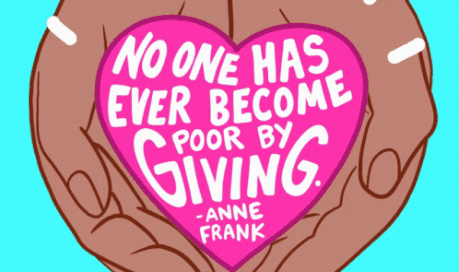
Crypto's art of giving 🫶
The role of crypto community in contributing to causes for social good, and how cryptocurrencies are proving useful in facilitating fast and easy donations during crises.
Hello, y'all. This is The Rabbit Hole. The world could do with more - loving, caring, giving. Same goes for our dispatches. Join our telegram. Please? 🤟
Traditional donation methods are like sending a letter without knowing if it ever reached its destination. You hope it got there, but you have no way of knowing for sure. Only 44% of people trust them, which is down from 53% in 2019. But that’s not the case with crypto donations.
Donations made in crypto are like using a tracking number when you ship a package - you can see exactly where it is at all times and when it gets delivered. And with smart contracts, it's like having a trusted friend hold onto your money until the conditions of the agreement are met. So why settle for uncertainty when you can have peace of mind with crypto donations?
Charities are starting to hop on the crypto train or risk going extinct. Take WikiLeaks, for example. In 2010, Visa, Mastercard, PayPal and Bank of America all gave the middle finger to WikiLeaks and blocked them from receiving cash transfers. But crypto came to the rescue, allowing WikiLeaks to keep on truckin' and exposing the not-so-pretty truths about US war crimes in Iraq and Afghanistan.
But it's not just about sticking it to the man. Crypto giving also challenges government control over good causes. Organisations like the Tor Project, Sea Shepherd and Greenpeace have had their bank accounts frozen, forcing them to rethink their goals and bend to the will of corrupt politicians. With crypto, these issues disappear and donors can actually track where their money is going. No more worrying if your donation is going towards a CEO's fancy yacht or actually helping people in need.
Why not sponsor, eh?

A promising future
The Giving Block Data data projection shows that the cryptocurrency donations are set to exceed $10 billion in the next decade, as per the crypto charity platform 2023 annual report - Crypto Philanthropy Data, Trends & Predictions.
Key highlights
All-time crypto donations in the platform surpassed $125 Million in 2022.
Based on the data available, it could top $1 Billion by August 2027.
Reach $5 Billion in June 2031, and upto $10 Billion mark in November 2032.
Most donated crypto - USDC 44%, ETH 24%, and BTC with 17%.
Ethereum co-founder Vitalik Buterin held the record for the largest crypto donation of the year, giving $9.4 million through Balvi, his philanthropic fund.
Fast and Easy
The speed of transactions and the global nature of cryptocurrency transactions are proving to be important means of providing quick monetary support during times of crisis. The ability to accurately monitor blockchain data is a big plus for cryptocurrencies in facilitating donations and support after disasters and major emergencies
Chainalysis director of research Kim Grauer is a strong believer.
“Cryptocurrency is cross-border, instantaneous, and liquid, making it an ideal technology for raising funds and getting them to where they are needed most quickly … The transparency of blockchains is a unique benefit to cryptocurrency, providing opportunities to aid organisations to track donations and for law enforcement agencies to identify and trace illegitimate schemes attempting to capitalise in times of crisis.”
Antonia Roupell, Web3 operations lead at Save the Children.
“The vast majority of our crypto donors are first-time donors to Save the Children so crypto has enabled us to access a new and growing supporter base … Cryptocurrency is a great donation vehicle, but the underlying technology, peer-to-peer electronic cash, is truly revolutionary for economic inclusion.”
The blockchain-based solutions have great value in facilitating and supporting aid efforts around the world. The humanitarian organisations will have an increasingly key role to play in integrating and scaling access at grassroots levels.
Who Accepts Crypto
There are several dedicated crypto NGOs and projects that facilitate crypto donations to various causes. The Giving Block is a prominent brand that makes it easy for non-profits to fundraise crypto. It partners with non-profits focused on specific causes and is also aligned with impact index funds that disburse funds to projects that relieve the most suffering. Crypto for Charity and Daffy are also popular platforms that facilitate crypto donations to non-profits.
Many crypto projects have their own charity arms, such as Binance Charity Foundation, which has donated millions of dollars to various causes. During the COVID-19 pandemic, Polygon and other projects raised funds for hotspots, while Gitcoin runs funding rounds for open-source crypto projects and matches charitable donations.
Major NGOs and charity funds like the Electronic Freedom Foundation, UNICEF, Greenpeace, and the Human Rights Foundation also accept crypto donations. Fidelity operates a donor-advised bitcoin fund that allows donors to send bitcoin to charity and avoid capital gains taxes on sales. Even governments, such as the Ukrainian government, have accepted crypto donations by listing crypto wallets on their social media accounts.
Projects Enabling Crypto Donations
There are some new ways to give to charity that are kind of creepy, to be honest. AidChain created a digital token called aidcoin that lets you keep tabs on where your money goes. They even encourage charities to pay their bills with aidcoin to make tracking easier.
Promise is another platform that makes charities prove they've hit certain milestones before getting more funds. It has partnered with eight charities – including one of the UK’s largest charitable trusts, English Heritage – in addition to collaborating with Charity Checkout, a platform available to 2,000 registered charities.
And Humanity Token takes things to a whole new level by letting donors control exactly what recipients can buy (sorry, no cigarettes or booze for you!). Oh, and they're also tracking the behaviour of the people they're supposed to be helping. Sounds like Big Brother is now in the business of charity.
Crypto Aid in-action
Turkey Earthquake
Endaoment, a non-profit organisation that manages crypto donations, has been helping to provide aid to earthquake-hit Turkey and Syria.
But it's not just Endaoment doing good - Turkey Relief DAO has also sprung into action to raise funds for government agencies and NGOs helping in the disaster area. With attention from the media fleeting, it's important to keep the momentum going and support those in need.
Turkey Relief DAO works with the government and NGOs to collect donations on 18 different chains, making it easier than ever to make a difference.
In the wake of the devastating earthquakes in Turkey, several big players in the crypto world have stepped up to help. The Turkish Ministry of Interior's Earthquake Humanitarian Aid campaign, the Turkish Red Crescent, Save the Children, and Project Hope are among the organisations that have received cryptocurrency-based donations to support their relief efforts in Turkey and Syria. According to Chainalysis, over $5.9 million worth of cryptocurrency donations have been made to support relief efforts in Turkey and Syria. Crypto exchanges like Binance, Bitfinex, OKX, and KuCoin also donated more than $9 million to help victims in the area.
To monitor these crypto donations, Chainalysis uses a mix of human intelligence and clever technology to track flows of cryptocurrency to organisations accepting donations, as well as sniffing out scams trying to trick people into sending their money to the wrong place.
The Ukraine Russia War
Tech-savvy Ukraine was quick to realise that crypto is the fastest and easiest way to handle the flood of international donations. Known for its tech talent, Ukraine already legalised bitcoin and other cryptos back in 2021 and ranked fourth on Chainanalysis’ 2021 Global Crypto Index.
It's interesting to see that Ukraine has expanded its list of accepted cryptocurrencies to include DOGE, SOL, and TRX, in addition to BTC, ETH, USDT (ERC-20 and TRC-20), and DOT. The Aid For Ukraine project, which is a collaboration between the Ukrainian government, Solana blockchain, and Everstake, is another example of the increasing use of blockchain technology to aid in relief efforts during times of crisis.
Binance launched the Ukraine Emergency Relief Fund, a crypto-first crowdfunding site to support crypto donations readily.
Pussy Riot, the punk music group famous for its protest performances against Putin, has created UkraineDAO to raise funds for Ukraine. In collaboration with Trippy Labs and PleasrDAO, they are selling 10,000 NFTs of the Ethereum-minted Ukrainian national flag. The initiative has already raised over $5 million in donations, with $4.6 million from NFT sales and $450,000 from direct donations.
Ukraine is not backing down in the face of the Russian invasion and is finding new ways to raise funds. The Ukrainian Ministry of Digital Transformation is launching an NFT collection that documents the war between Russia and Ukraine. These NFTs not only preserve the true events of the war but also aim to collect donations for supporting Ukraine. All funds raised from NFT sales will go directly to the Ukrainian Ministry of Digital Transformation.
The President of the Blockchain Association of Ukraine, Michael Chobanian, is keeping everyone in the loop through his Twitter account. In his latest update, he shared that the Ukrainian government has received over $50 million worth of cryptocurrency donations in their official wallets. That's a lot of crypto love for Ukraine!
TTD Week That Was 📆
The week AI hogged all the limelight.
Saturday: DAO treasuries top $25 Billion 🏢 💵
Friday: Will AI rewrite history? 📜 ✍️
Thursday: Is AI the bigger threat than crypto? 💀
Wednesday: Is it the time for tokenised real estate? 🏘️
TTD Week In Funding 💰
Ledger $108 Million. To ramp up the hardware wallet game, for a more secure way to store your crypto assets.
Fetch.ai $40 Million. To build infrastructure for smart, autonomous services, for automation of web3 systems.
Particle Network $7 Million. Login and wallet middleware solution for developers to integrate web3 authentication into decentralised apps.
Cega $5 Million. To build better derivative solutions for investors, to find safer yields in volatile market conditions.
SO-COL $1.5 Million. Web3 social platform wants to go multichain and support more Layer 1 and Layer 2 blockchains.
If you like us, if you don't like us .. either ways do tell us✌️
If you dig what we do, show us some love on Twitter & Instagram🤞
So long. OKAY? ✋






















